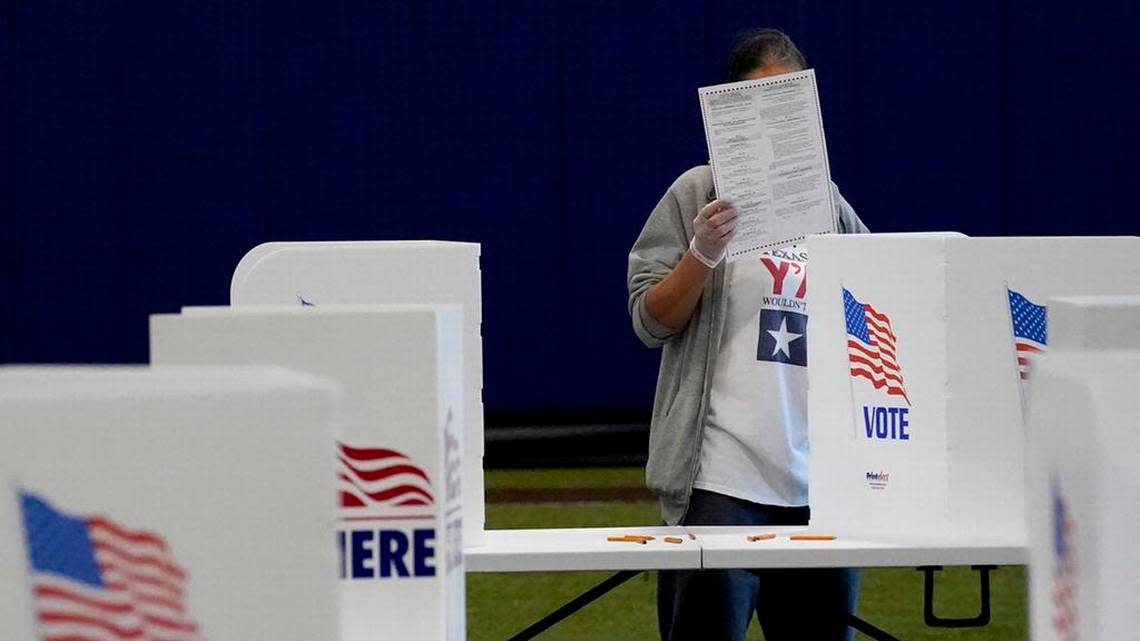League of Women Voters, NAACP sue Missouri to block new voter registration restrictions

Two civic engagement groups this week sued the state of Missouri, arguing that a new state elections law restricts voter registration activities and the distribution of absentee ballots.
The lawsuit, filed in Cole County on behalf of the League of Women Voters and the Missouri NAACP, contends that the law chills the groups’ abilities to engage with voters and violates their rights to political speech. It asks a judge to block certain provisions of the state law from taking effect before the Nov. 8 election.
“Because of these provisions, the Missouri NAACP will have to stifle our voter registration and absentee voting activities — at the very time heading into the midterm elections when the NAACP would be otherwise engaging these communities in registration and absentee voting,” Nimrod Chapel, Jr., president of the Missouri State Conference of the NAACP, said in an emailed statement.
The lawsuit is the first legal challenge against Missouri’s sweeping elections law signed by Republican Gov. Mike Parson in July. The law from the GOP-controlled legislature came after nearly two years of baseless claims from former Donald Trump and his supporters about widespread voter fraud in the 2020 election.
The suit also names Missouri Secretary of State Jay Ashcroft, a Republican who supported the law, and Cole County Prosecuting Attorney Locke Thompson as defendants. Neither immediately responded for requests for comment. A spokesperson for Missouri Attorney General Eric Schmitt, who will defend the state, declined comment.
The groups’ lawsuit specifically challenges provisions of the law that ban compensation for voter registration activities and require anyone who assists with more than 10 voter registration applications to be a registered voter and register with the state.
“To comply with the Compensation Ban, the Missouri NAACP will be forced to stop providing reimbursement to its members and to stop paying interns, volunteers, and short-term staff who undertake registration work,” the lawsuit said. “The organization will also need to change its policies to forbid volunteers from partaking in food or drinks provided at voter registration events and to stop providing volunteers with t-shirts and other materials.”
Missouri Voter Protection Coalition, one of the groups that filed the suit, said in a statement that the compensation ban would put organizations at risk of violating the law for offering reimbursement for parking or pizza to volunteers.
The suit also challenges a provision of the law that bans people from soliciting a voter into obtaining an absentee ballot application. It contends that because the law does not define “solicit,” it could put innocent volunteers at risk of violating the law.
“The Absentee Ballot Solicitation Ban is so vague that encouraging and assisting voters to vote via in-person absentee voting—where voters appear in person, apply to vote absentee with an election authority, and vote at the same time—may be considered “soliciting” an absentee ballot application,” the lawsuit says.
The lawsuit states that without court action, the state law would be used in the upcoming Nov. 8 general election and would create barriers to voter registration and absentee voting. Communities of color would be disproportionately impacted by those barriers, the lawsuit contends.
The sweeping elections law, sponsored by state Rep. John Simmons, a Washington Republican, will take effect on Aug. 28.
Among other provisions, it requires voters to show a photo ID at the ballot box, prohibits touchscreen voting machines after 2024 and allows Ashcroft’s office to audit voter rolls. It also gets rid of presidential primaries in Missouri — replacing them with a series of caucuses — and gives voters a two-week period to cast absentee ballots without an excuse.
Denise Lieberman, director and general counsel of Missouri Voter Protection Coalition, said in a phone call Tuesday that her group plans to file another lawsuit challenging the law’s photo ID requirement.
“What we are are looking to do is to both challenge restrictions that disproportionately harm voters’ access to the ballot and the provisions that criminalize civic engagement,” she said.
The law was a result of a sustained push from Missouri Republicans to enact some form of voter ID requirement. The Supreme Court of Missouri struck down a previous voter ID law in 2020 that would have required people who voted without a photo ID to sign a sworn statement stating they don’t have “a form of personal identification approved for voting.”
Missouri Supreme Court Judge Mary Russell, in the court’s affirmative opinion, called the sworn statement “contradictory” and “misleading.” She wrote that the affidavit requirement was not a reasonable way to combat voter fraud.
Democrats and voting rights advocates have decried the state’s new legislation as an attempt to stifle voting rights. They have argued the voter ID requirements would hurt minorities and seniors who don’t have forms of photo identification.






